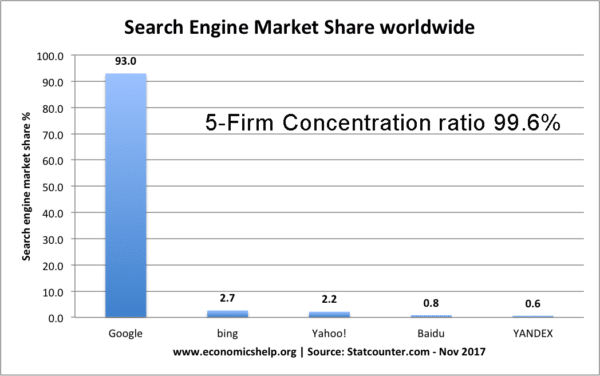An examination of consumer and producer sovereignty. Also, an evaluation of which is stronger – who drives markets – is it, consumers or producers?
Definition consumer sovereignty
The ability and freedom of consumers to choose from a range of different goods and services. It means that ultimately it is consumers who will decide what is produced and how scarce resources are allocated.
Consumer sovereignty is an important concept for classical economics. This assumes that consumers have the freedom and ability to choose between different suppliers and firms. In theory, consumers will use their discretion to choose the cheapest and/or best quality goods. In theory, this consumer sovereignty ensures the effective functioning of free markets. It rewards efficient firms and encourages firms to provide goods consumers want.
When describing the workings of a market economy, Adam Smith referred to an invisible hand – this involves consumers choosing certain goods – thus rewarding the firms who produce the goods which are in demand. Those who cannot win over customers will either have to improve the goods they offer or go out of business.
Thus consumer sovereignty forms an important aspect of free market economics, it is a function developed by the economist Ludwig Von Mises.
“The capitalists, the enterprisers, and the farmers are instrumental in the conduct of economic affairs. They are at the helm and steer the ship. But they are not free to shape its course. They are not supreme, they are steersmen only, bound to obey unconditionally the captain’s orders. The captain is the consumer.” (Bureaucracy, “Profit Management,” p. 226 )
Mises noted how consumers:
- Cared nothing for past merit – and would quickly switch if another firm offered something more attractive.
- The whims of consumers could not easily be guessed and subject to fluctuations and fashions.
- Influence of word of mouth. For many firms, their reputation developed by customer reviews and feedback can quickly spread – making or breaking a firm.
Definition producer sovereignty
This is when firms have the power and ability to influence consumer decisions. For example, in a monopoly consumers have no choice and have to pay the price and buy the goods offered by firms. Producer sovereignty means that it is firms who will decide what to do. For example, some argue persuasive advertising techniques mean consumers will buy what firms wish to sell.
In reality, there is a mixture of both consumer and producer sovereignty. But, if markets are more competitive, consumer sovereignty plays a more important role.
Examples of producer vs consumer sovereignty
Chamath Palihapitiya, who was vice-president for user growth at Facebook before he left the company in 2011 argued that Facebook created a product that got users addicted and drove them to spend more time on the network. The former Facebook executive said the culture of Facebook user growth was based on
“The short-term, dopamine-driven feedback loops that we have created are destroying how society works. No civil discourse, no cooperation, misinformation, mistruth.” (Guardian)
This shows how a company can create a product to hook customers into using.
Mac products – iPod, iPhone

The quote by Jobs reflected his business ethos. He felt firms should not respond to consumer preferences, but anticipate what they will like. This requires innovation, thinking outside the box and creating something new that they will like. For many years, Mac products set industry and consumer trends. (2014)
Gambling machines

Digital downloads

Trip Advisor reviews for Airbnb

According to this definition of the search engine market by Statcounter.com, Google has 93% share of the search engine market worldwide. Customers have strong brand loyalty and see no reason to keep evaluating between different search engines – we stick with our default options. This gives Google significant producer sovereignty and ability to drive the changes they want.

Conclusion
There is an interesting balance between consumer sovereignty and producer sovereignty. It depends on
- Market structure – in competitive markets consumer sovereignty is stronger. In monopoly, producer sovereignty is stronger
- Industry. Technology is fast-changing. Firms like Apple need to anticipate consumer preferences. Something like drinking outlets like pubs vs coffee-shops there is limited innovation and it comes down to which consumers prefer. There is little firms can do at social shifts which are causing less alcohol to be drunk during the day.
- Behavioural economics. It is worth considering insights of behavioural economics. Consumer sovereignty is associated with rational economic man – we choose goods which maximise our utility. But, behavioural economics suggests consumers can be influenced by more irrational influences
- Internet. In some regards, the internet has increased the power of consumer sovereignty, e.g. reviews of restaurants, hotels. But, also powerful IT firms like Facebook and Google have the market power to influence what consumers get.
Related


some more information about who realy is the king in the market between consumers and producers.
CONSUMER SOVEREIGNTY+PRODUCER SOVEREIGNTY=MARKET SOVEREIGNTY
Your article certainly answered questions for me and it was written in such a way that was easily understood and I thank you for that. This also helped me with my macroeconomic class topic we were discussing and now can put into my own words. thanks and ~~health and wellness~~